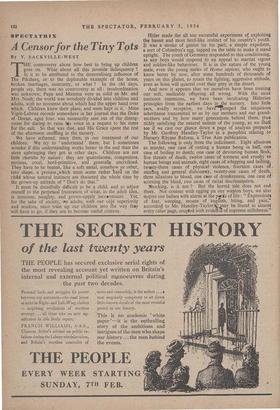A Censor for the Tiny Tots
By V. SACKVILLE-WEST We have softened, since then, in our treatment of our children. We try to ' understand ' them; but I sometimes wonder if this understanding works better in the end than the stern upbringing they got in other days. Children are not little cherubs by nature: they are quarrelsome, competitive, envious, cruel, herd-primitive, and generally uncivilised. They have to be beaten, like a soft metal, somehow or other, into shape, a process ,,which must come rather liar8 on the child whose natural instincts are thwarted the whole time by the grown-up attitude of " Don't do that."
It must be dreadfully difficult to be a child, and to adjust oneself to the perpetual frustration of what, in the adult idea, is tiresome, naughty, and grown-uppily inconvenient. Yet,' for the sake of society, we adults, with our cold superiority and wisdom, must train up our children into the way they will have to go, if they are to become useful citizens.
1
Hitler made the all too successful experiment of exploiting the basest and most herd-like instinct of his country's youth. It was a stroke of genius on his part, a simple expedient, a sort of Columbus's egg, tapped on the table to make it stand upright. The youth of Germany responded to this conditioning, as any boys would respond to an appeal to martial vigour and soldier-like behaviour. It is in the nature of the young male, even the young males of Homo sapiens, who ought to know better by now, after some hundreds of thousands of years, on this planet, to retain the fighting, aggressive attitude, even as lions will quarrel over their prey in the desert. And now it appears that we ourselves have been treating our soft, malleable offspring all wrong. With the most innocent intentions, we have been inculcating Hitlerian principles from the earliest days in the nursery. Into little ears, avidly receptive, we have.umped the iniquitous inheritance transmitted to us by our mothers and our grand- mothers and by how many generations behind them, thus richly satisfying the natural sadism of the young, as we shall see if we cast our glance down a page of analysis prepared by Mr. Geoffrey Handley-Taylor in a pamphlet relating to Nursery Rhyme Reform, a True Aim publication. The following is only from the indictment. Eight allusions to murder, one case of cutting a human being in half, one case of boiling to death, one case of devouring human flesh, five threats of death, twelve cases of torment and cruelty to human beings and animals, eight cases of whipping and lashing, twenty-three cases of physical violence, fourteen cases of stealing and general dishonesty, twenty-one cases of death, three allusions to blood, one case of drunkenness, one case of scorning the blind, two cases of racial discrimination.
*locking, is it not '? But the horrid tale does not end there. Not content with egging on our wanton boys, we also inspire our babies with alarm at the pails of life: " Expressions of fear, weeping, moans of anguish, biting, and pain," according to Mr. Handley-Taylor,V.,kiay be found in almost every other page, coupled with evidence of supreme selfishness." Mr. Handley-Taylor is by no means the first to draw attention to this state of affairs. As we may learn from Mr. and Mrs. Peter Opie's majestic Oxford Dictionary of Nursery Rhymes, a certain Samuel Griswold Goodrich, an American born in 1793, devoted thirty years of his life to the reform of infantile literature, and " very nearly succeeded in banishing the nursery rhyme and fairy tale from the more expensive (sic) nurseries of both England and America." Remembering the tales of ogres, wolves in disguise, Bluebeard's cupboards, insecure cradles, and the blood of an Englishman, who Shall say that Mr. Goodrich and Mr. Handley-Taylor have not got right on their side, and that this rough stuff will no longer do '?
The curious thing is that child psychology does not appear to be affected. It would take an expert to explain why, but speaking as an ordinary observer it seems to me that the logic of the childish mind is unpredictable and its powers of association almost non-existent. It takes things for granted. There is, in short, a sharp division between a story, where anything may happen, and any connected possibility in real life. This is not to assert that irrational fear is unknown; far from it; bin that fear is as likely to he produced by.a stain on one's own ceiling as by the idea of a farmer's wife running after mice with a carving knife. That is the worst of children: you can never tell. With all respect to Mr. Handley-Taylor, whose sincerity is clearly beyond question, Punch and Judy arc more likely to be received with squeals of delight than by howls of dismay. Nor should one forget that it is great fun to see, or to hear of, somebody else getting into trouble: it amounts to a vicarious protection against anything of the same sort happening to oneself. Children are pretty shrewd. Two small schoolboys, questioned by their mother about their holiday governess, replied, "Oh, she seems all right, but we don't think she has quite got control of us yet." What is so disconcerting about them is their pathetic- lack of experience, for when your experience is so limited how can you possibly be expected to relate one thing to another ? You have at an early age learnt to appreciate certain hard facts. The fact that punishment follows crime is painfully easy to absorb, but the nature of the crime is. less easy to understand. Why should it be Considered so wrong to shy a cricket-ball through Mr. Winka- maloo's window, when you have overheard your own father saying that Mr. Winkamaloo deserves to he shot ? Besides, it was such fun, hearing the glass smash. Destruction is always fun; some atavistic instinct proclaims it; the pleasure of building up a pyramid of bricks on the nursery floor is nothing compared with the pleasure of toppling it over, or of setting up a regiment of lead soldiers and. then shooting them down with hard peas in a pretence Bren gun. All this is permitted, and even welcomed, by the grown-ups as a method of keeping you ,occupied and quiet. Yet retribution descends instantly. the moment your game irrupts into the values of the grown-up world, and you destroy something held in high esteem, such as when you slashed off all the heads of the lilies with your toy sword as you ran along the garden Path. Justice and injustice appear to be curiously confused. You accept your scoldings with the resignation of childhood, and it scarcely occurs to you to wonder why.



































 Previous page
Previous page